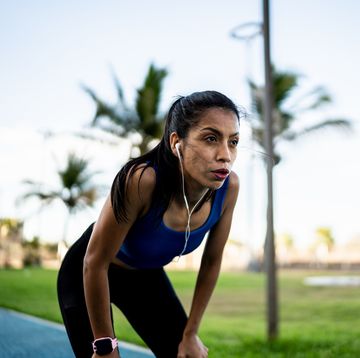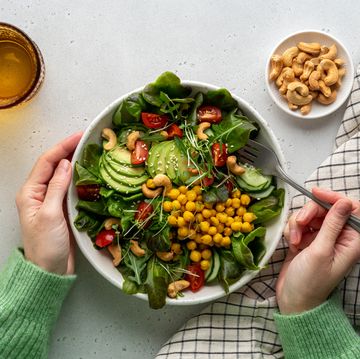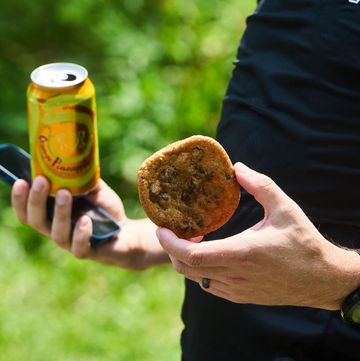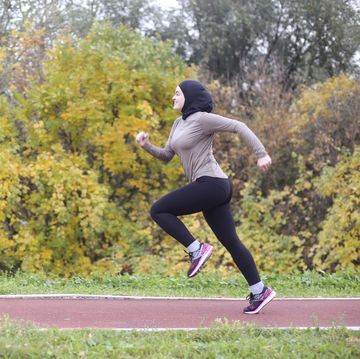- A recent study, published in the journal Aging Clinical and Experimental Research, suggests low levels of vitamin D may play a role in how much people are affected by COVID-19.
- Getting outside in the sun (safely!) and eating foods high in vitamin D—salmon, tuna, eggs, and mushrooms—can help boost your levels.
There are many reasons to pay attention to your vitamin D intake: healthier bones, more lean muscle mass, better aerobic fitness, and a boosted immune system are a few of them. One more reason to (carefully) soak up a little sunshine? A recent study, published in the journal Aging Clinical and Experimental Research, suggests low levels of vitamin D may play a role in how much people are affected by COVID-19.
Looking at 20 European countries, researchers compared average levels of vitamin D, the numbers of COVID-19 cases for each country, and mortality rates. They found that countries with lower vitamin D levels—like Italy and Spain—also have high mortality rates from the virus.
Although those two countries are known for their sunny climates, people in southern Europe—particularly the elderly—tend to avoid spending time in the sun, study coauthor Petre-Cristian Ilie, M.D., Ph.D., research director at Queen Elizabeth Hospital King’s Lynn NHS Foundation Trust in the U.K., told Runner’s World.
Of course, correlation does not equal causation. But this research isn’t the only recent study to suggest a connection between vitamin D and COVID-19. A research team out of Northwestern University just published a preliminary study also suggesting that the dramatic variation in the virus mortality rates across populations could have vitamin D as a factor.
The limitation with these studies is that vitamin D is not measured in COVID-19 patients, those researchers noted, but previous studies on the vitamin and its role in immune health do provide some strong associations.
Specifically, the Northwestern study suggests vitamin D may reduce COVID-19 severity by suppressing a “cytokine storm”—which happens when the immune response becomes so aggressive that it causes cell death and increases susceptibility to acute respiratory tract infections.
But why vitamin D in particular? It’s because this specific vitamin is a powerhouse when it comes to protective effects, Ilie said.
“Approximately 3 percent of the human genome is under the control of vitamin D,” he said. He goes on to explain that vitamin D influences your “innate and adaptive” immune response, and that receptors for the vitamin are found on many cells involved in immune defense, such as B-cells, T-cells, and macrophages, which are all types of white blood cells that work to protect your body against illness and disease.
In terms of how much you need daily to boost all those effects, that’s still up for debate. The recommended dietary allowance is 600 international units (IU), but the Endocrine Society suggests consuming potentially much higher levels of 1,500 to 2,000 IU daily.
You can get a boost from foods that are rich with vitamin D, such as salmon, tuna, eggs, and mushrooms. You’ll see the vitamin added to milk, too, because it makes the calcium in dairy more easily absorbed.
Alternatively, you could rely on the old standby: sunshine. In general, you only need about 10 to 20 minutes of sunshine per day to get your daily dose, according to Michael Holick, M.D., Ph.D., director of the Bone Health Care Clinic at Boston University Medical Center.
[Run faster, stronger, and longer with this 360-degree training program.]
He told Runner’s World it’s best to get sun on your shoulders, arms, or legs instead of your back or face—the former increases cancer risk and the latter ups your wrinkle and blemish risk. (Dermatologists recommend an SPF of 30 or greater that blocks both UVA and UVB rays and contains zinc oxide or titanium dioxide in the ingredients—plus a reapplication every two hours.)
No matter what your source, it may be a good idea to focus on increasing your vitamin D right now—and considering the benefits, maybe make it a priority well into the future, too.
Elizabeth Millard is a freelance writer focusing on health, wellness, fitness, and food.













